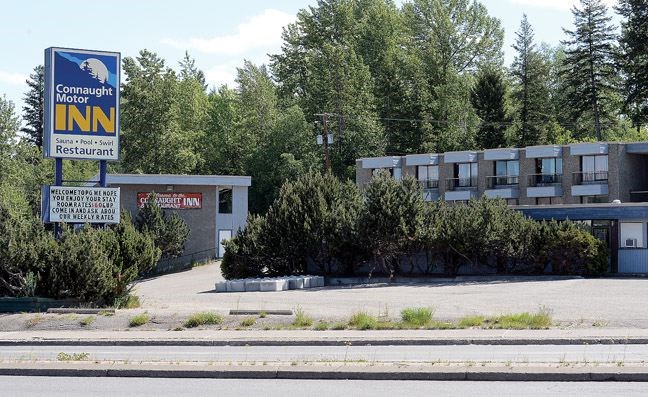During my nurses' training at St. Paul's Hospital in Vancouver in the 1960s, I worked at Essondale Mental Hospital. My husband and I also worked in a group home for delinquent boys in Vancouver. Two of our adopted children have received social welfare. Our family is involved in volunteering at St. Vincent de Paul. As a result, I am very interested in the problems of the "street people."
For years now (especially since reading about Dr. Abram Hoffer's work with schizophrenia, and his design for living spaces for them) as I drive past the Connaught Motor Inn, I have thought what an ideal setup that motel is for a facility for homeless and street people. Many of these people suffer with mental illness.
Dr. Abram Hoffer, did monumental work with schizophrenics beginning with his research in Saskatchewan in the 1950s and his work as a psychiatrist and consultant until his death at 92 years old in 2009 in Victoria. Dr. Hoffer and psychiatrist Dr. Humphry Osmond worked with an architect Kiyoshi Izumi to design living quarters for people with schizophrenia. They concluded that the ideal design would:
Provide as much privacy as possible.
Minimize ambiguity of architecture's design and detail.
Bear no intimidating features.
Foster spatial interactions that curtail the frequency and intensity of undesirable confrontations.
Izumi designed the circular hospital and two were built, the first in Saskatchewan, at Yorkton and the second at Prince Albert. The hospital at Yorkton won the silver medal for design from the American Psychiatric Association.
The original Yorkton Psychiatric Center concept, a semi-circular, single-storey building Izumi called the "sociopetal" plan, seemed to pay off all those criteria. It satisfied three tiers of human association - personal, relatively intimate and large - with individual retreats along the periphery, a central opening for large group activity and, in the space between, nooks for smaller group interaction.
Although the Connaught Motor Inn is different in design, it would still allow residents to have:
A private space of their own - until a person has a place of his/her own where they can protect their stuff, and a reliable source of food, there is no way they can contribute their talents to the community as all their energy is expended on concerns for food and lodging.
Help with medications - the office area of the motel could be transformed into a health and wellness station where they could be given their medications regularly.
Assistance accessing social services also in the office area. Having a special needs daughter, who receives social welfare, my husband and I are astounded at the maze these people have to go to for minimum care. Many are unable to read and write. Have you ever tried to contact a social services office by phone... horrific - just trying to get to the right office is exasperating! Most must give up in frustration and so would not be getting many of the services they are eligible for.
These poor people suffer terrible indignities that must humiliate and anger them and yet they are helpless to help themselves.
Regular healthy meals. There is a restaurant on the property that could easily be used as a cafeteria for these people. A lot of their problems stem from poor nutrition.
Social interaction with their neighbours. There is also space below the restaurant for social gatherings and possibly therapeutic resources such as music and art classes. I'm sure many of these people have some wonderful gifts that could be developed with the proper care.
"Schizophrenics are lonely because they cannot let their fellows know what is happening to them, and so lose the social support, help and encouragement which they need so much yet so rarely evoke," Osmond said.
As for funding, years ago, an excellent facility for addictions in Prince George, the "hidden gem" was funded, in part, by using the welfare cheques of the men, who in turn received room and board and the counselling and help they needed. I'm sure there are also charitable organizations in Prince George who would be willing to assist in such a worthwhile project.
This is an opportunity to lead the country in providing a solution to the tragic dilemma of homelessness.
-- Diane Fuller, Prince George


